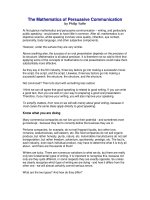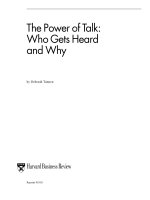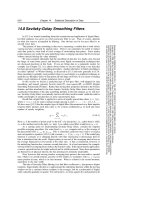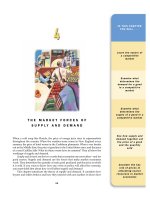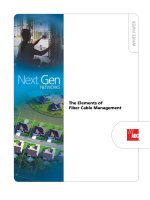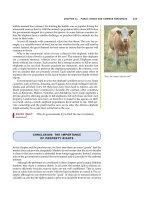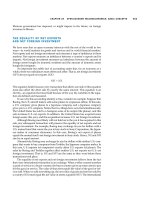Tài liệu The elements of style part 6 pptx
Bạn đang xem bản rút gọn của tài liệu. Xem và tải ngay bản đầy đủ của tài liệu tại đây (326.43 KB, 15 trang )
as a reason for not appearing at the dedicatory ceremonies of a cat hospital. But bear in
mind that your opinion of cats was not sought, only your services as a speaker. Try to
keep things straight.
18. Use figures of speech sparingly.
The simile is a common device and a useful one, but similes coming in rapid fire, one right
on top of another, are more distracting than illuminating. Readers need time to catch their
breath; they can't be expected to compare everything with something else, and no relief in
sight.
When you use metaphor, do not mix it up. That is, don't start by calling something a
swordfish and end by calling it an hourglass.
19. Do not take shortcuts at the cost of clarity.
Do not use initials for the names of organizations or movements unless you are certain the
initials will be readily understood. Write things out. Not everyone knows that MADD means
Mothers Against Drunk Driving, and even if everyone did, there are babies being born
every minute who will someday encounter the name for the first time. They deserve to see
the words, not simply the initials. A good rule is to start your article by writing out names in
full, and then, later, when your readers have got their bearings, to shorten them.
Many shortcuts are self-defeating; they waste the reader's time instead of conserving it.
There are all sorts of rhetorical stratagems and devices that attract writers who hope to be
pithy, but most of them are simply bothersome. The longest way round is usually the
shortest way home, and the one truly reliable shortcut in writing is to choose words that
are strong and surefooted to carry readers on their way.
20. Avoid foreign languages.
The writer will occasionally find it convenient or necessary to borrow from other languages.
Some writers, however, from sheer exuberance or a desire to show off, sprinkle their work
liberally with foreign expressions, with no regard for the reader's comfort. It is a bad habit.
Write in English.
76
For more material and information, please visit Tai Lieu Du Hoc at www.tailieuduhoc.org
21. Prefer the standard to the offbeat.
Young writers will be drawn at every turn toward eccentricities in language. They will hear
the beat of new vocabularies, the exciting rhythms of special segments of their society,
each speaking a language of its own. All of us come under the spell of these unsettling
drums; the problem for beginners is to listen to them, learn the words, feel the vibrations,
and not be carried away.
Youths invariably speak to other youths in a tongue of their own devising: they renovate
the language with a wild vigor, as they would a basement apartment. By the time this
paragraph sees print,
psyched, nerd, ripoff, dude, geek
, and
funky
will be the words of
yesteryear, and we will be fielding more recent ones that have come bouncing into our
speech — some of them into our dictionary as well. A new word is always up for survival.
Many do survive. Others grow stale and disappear. Most are, at least in their infancy, more
appropriate to conversation than to composition.
Today, the language of advertising enjoys an enormous circulation. With its deliberate
infractions of grammatical rules and its crossbreeding of the parts of speech, it profoundly
influences the tongues and pens of children and adults. Your new kitchen range is so
revolutionary it
obsoletes
all other ranges. Your counter top is beautiful because it is
accessorized
with gold-plated faucets. Your cigarette tastes good
like
a cigarette should.
And,
like the man says
, you will want to try one. You will also, in all probability, want to try
writing that way, using that language. You do so at your peril, for it is the language of
mutilation.
Advertisers are quite understandably interested in what they call "attention getting." The
man photographed must have lost an eye or grown a pink beard, or he must have three
arms or be sitting wrong-end-to on a horse. This technique is proper in its place, which is
the world of selling, but the young writer had best not adopt the device of mutilation in
ordinary composition, whose purpose is to engage, not paralyze, the readers senses. Buy
the gold-plated faucets if you will, but do not accessorize your prose. To use the language
well, do not begin by hacking it to bits; accept the whole body of it, cherish its classic form,
its variety, and its richness.
Another segment of society that has constructed a language of its own is business. People
in business say that toner cartridges are
in short supply
, that they have
updated
the next
shipment of these cartridges, and that they will
finalize
their recommendations at the next
meeting of the board. They are speaking a language familiar and dear to them. Its
portentous nouns and verbs invest ordinary events with high adventure; executives walk
77
For more material and information, please visit Tai Lieu Du Hoc at www.tailieuduhoc.org
among toner cartridges, caparisoned like knights. We should tolerate them — every
person of spirit wants to ride a white horse. The only question is whether business
vocabulary is helpful to ordinary prose. Usually, the same ideas can be expressed less
formidably, if one makes the effort. A good many of the special words of business seem
designed more to express the user's dreams than to express a precise meaning. Not all
such words, of course, can be dismissed summarily; indeed, no word in the language can
be dismissed offhand by anyone who has a healthy curiosity.
Update
isn't a bad word; in
the right setting it is useful. In the wrong setting, though, it is destructive, and the trouble
with adopting coinages too quickly is that they will bedevil one by insinuating themselves
where they do not belong. This may sound like rhetorical snobbery, or plain stuffiness; but
you will discover, in the course of your work, that the setting of a word is just as restrictive
as the setting of a jewel. The general rule here is to prefer the standard.
Finalize
, for
instance, is not standard; it is special, and it is a peculiarly fuzzy and silly word. Does it
mean "terminate," or does it mean "put into final form"? One can't be sure, really, what it
means, and one gets the impression that the person using it doesn't know, either, and
doesn't want to know.
The special vocabularies of the law, of the military, of government are familiar to most of
us. Even the world of criticism has a modest pouch of private words (
luminous, taut
),
whose only virtue is that they are exceptionally nimble and can escape from the garden of
meaning over the wall. Of these critical words, Wolcott Gibbs once wrote, " they are
detached from the language and inflated like little balloons." The young writer should learn
to spot them — words that at first glance seem freighted with delicious meaning but that
soon burst in air, leaving nothing but a memory of bright sound.
The language is perpetually in flux: it is a living stream, shifting, changing, receiving new
strength from a thousand tributaries, losing old forms in the backwaters of time. To
suggest that a young writer not swim in the main stream of this turbulence would be foolish
indeed, and such is not the intent of these cautionary remarks. The intent is to suggest that
in choosing between the formal and the informal, the regular and the offbeat, the general
and the special, the orthodox and the heretical, the beginner err on the side of
conservatism, on the side of established usage. No idiom is taboo, no accent forbidden;
there is simply a better chance of doing well if the writer holds a steady course, enters the
stream of English quietly, and does not thrash about.
"But," you may ask, "what if it comes natural to me to experiment rather than conform?
What if I am a pioneer, or even a genius?" Answer: then be one. But do not forget that
78
For more material and information, please visit Tai Lieu Du Hoc at www.tailieuduhoc.org
what may seem like pioneering may be merely evasion, or laziness — the disinclination to
submit to discipline. Writing good standard English is no cinch, and before you have
managed it you will have encountered enough rough country to satisfy even the most
adventurous spirit.
Style takes its final shape more from attitudes of mind than from principles of composition,
for, as an elderly practitioner once remarked, "Writing is an act of faith, not a trick of
grammar." This moral observation would have no place in a rule book were it not that style
is
the writer, and therefore what you are, rather than what you know, will at last determine
your style. If you write, you must believe — in the truth and worth of the scrawl, in the
ability of the reader to receive and decode the message. No one can write decently who is
distrustful of the reader's intelligence, or whose attitude is patronizing.
Many references have been made in this book to "the reader," who has been much in the
news. It is now necessary to warn you that your concern for the reader must be pure: you
must sympathize with the reader's plight (most readers are in trouble about half the time)
but never seek to know the reader's wants. Your whole duty as a writer is to please and
satisfy yourself, and the true writer always plays to an audience of one. Start sniffing the
air, or glancing at the Trend Machine, and you are as good as dead, although you may
make a nice living.
Full of belief, sustained and elevated by the power of purpose, armed with the rules of
grammar, you are ready for exposure. At this point, you may well pattern yourself on the
fully exposed cow of Robert Louis Stevenson's rhyme. This friendly and commendable
animal, you may recall, was "blown by all the winds that pass /And wet with all the
showers." And so must you as a young writer be. In our modern idiom, we would say that
you must get wet all over. Mr. Stevenson, working in a plainer style, said it with felicity, and
suddenly one cow, out of so many, received the gift of immortality. Like the steadfast writer,
she is at home in the wind and the rain; and, thanks to one moment of felicity, she will live
on and on and on.
1935
T H E E N D
________
Thank you John.
E-mail:
79
For more material and information, please visit Tai Lieu Du Hoc at www.tailieuduhoc.org
Afterword
WILL STRUNK and E. B. White were unique collaborators. Unlike Gilbert and Sullivan, or
Woodward and Bernstein, they worked separately and decades apart.
We have no way of knowing whether Professor Strunk took particular notice of Elwyn
Brooks White, a student of his at Cornell University in 1919. Neither teacher nor pupil
could have realized that their names would be linked as they now are. Nor could they have
imagined that thirty-eight years after they met, White would take this little gem of a
textbook that Strunk had written for his students, polish it, expand it, and transform it into a
classic.
E. B. White shared Strunk's sympathy for the reader. To Strunk's do's and don'ts he added
passages about the power of words and the clear expression of thoughts and feelings. To
the nuts and bolts of grammar he added a rhetorical dimension.
The editors of this edition have followed in White's footsteps, once again providing fresh
examples and modernizing usage where appropriate.
The Elements of Style
is still a little
book, small enough and important enough to carry in your pocket, as I carry mine. It has
helped me to write better. I believe it can do the same for you.
Charles Osgood
80
For more material and information, please visit Tai Lieu Du Hoc at www.tailieuduhoc.org
Glossary
adjectival modifier A word, phrase, or clause that acts as an adjective in qualifying the
meaning of a noun or pronoun,
Your
country; a
turn-of-the-century
style; people
who are
always late
.
adjective A word that modifies, quantifies, or otherwise describes a noun or pronoun.
Drizzly
November; midnight
dreary; only
requirement.
adverb A word that modifies or otherwise qualifies a verb, an adjective, or another adverb.
Gestures
gracefully
;
exceptionally
quiet engine.
adverbial phrase A phrase that functions as an adverb. (See
phrase
.) Landon laughs
with
abandon
.
agreement The correspondence of a verb with its subject in person and number (Karen
goes
to Cal Tech; her sisters
go
to UCLA), and of a pronoun with its antecedent in person,
number, and gender (As soon as Karen finished the exam,
she
picked up
her
books and
left the room).
antecedent The noun to which a pronoun refers. A pronoun and its antecedent must agree
in person, number, and gender. Michael and
his
teammates moved off campus.
appositive A noun or noun phrase that renames or adds identifying information to a noun it
immediately follows. His brother,
an accountant with Arthur Andersen
, was recently
promoted.
articles The words
a
,
an
, and
the
, which signal or introduce nouns. The definite article
the
refers to a particular item:
the
report. The indefinite articles
a
and
an
refer to a general item
or one not already mentioned:
an
apple.
auxiliary verb A verb that combines with the main verb to show differences in tense,
person, and voice. The most common auxiliaries are forms of
be
,
do
, and
have
. I
am
going;
we
did
not go; they
have
gone. (See also
modal auxiliaries.
)
case The form of a noun or pronoun that reflects its grammatical function in a sentence as
subject (
they
), object (
them
), or possessor (
their
).
She
gave
her
employees a raise that
pleased
them
greatly.
clause A group of related words that contains a subject and predicate.
Moths swarm
around a burning candle. While
she was taking
the test,
Karen muttered
to herself.
81
For more material and information, please visit Tai Lieu Du Hoc at www.tailieuduhoc.org
colloquialism A word or expression appropriate to informal conversation but not usually
suitable for academic or business writing. They wanted to
get even
(instead of they wanted
to
retaliate
).
complement A word or phrase (especially a noun or adjective) that completes the
predicate. Subject complements complete linking verbs and rename or describe the
subject: Martha is my
neighbor
. She seems
shy
. Object complements complete transitive
verbs by describing or renaming the direct object: They found the play
exciting
. Robert
considers Mary
a wonderful wife
.
compound sentence Two or more independent clauses joined by a coordinating
conjunction, a correlative conjunction, or a semicolon.
Caesar conquered Gaul
, but
Alexander the Great conquered the world
.
compound subject Two or more simple subjects joined by a coordinating or correlative
conjunction.
Hemingway and Fitzgerald
had little in common.
conjunction A word that joins words, phrases, clauses, or sentences. The coordinating
conjunctions,
and, but, or, nor, yet, so, for
, join grammatically equivalent elements.
Correlative conjunctions (
both, and; either, or; neither, nor
) join the same kinds of
elements.
contraction A shortened form of a word or group of words:
can't
for cannot;
they're
for they
are.
correlative expression See
conjunction
.
dependent clause A group of words that includes a subject and verb but is subordinate to
an independent clause in a sentence. Dependent clauses begin with either a subordinating
conjunction, such as
if, because, since
, or a relative pronoun, such as
who, which, that
.
When it gets dark
, we'll find a restaurant
that has music
.
direct object A noun or pronoun that receives the action of a transitive verb. Pearson
publishes
books
.
gerund The
-ing
form of a verb that functions as a noun:
Hiking
is good exercise. She was
praised for her
playing
.
indefinite pronoun A pronoun that refers to an unspecified person (
anybody
) or thing
(
something
).
independent clause A group of words with a subject and verb that can stand alone as a
sentence.
Raccoons steal food
.
indirect object A noun or pronoun that indicates to whom or for whom, to what or for what
the action of a transitive verb is performed. I asked
her
a question. Ed gave
the door
a kick.
82
For more material and information, please visit Tai Lieu Du Hoc at www.tailieuduhoc.org
infinitive/split infinitive In the present tense, a verb phrase consisting of
to
followed by the
base form of the verb (
to write
). A split infinitive occurs when one or more words separate
to
and the verb (
to boldly go
).
intransitive verb A verb that does not take a direct object. His
nerve failed
.
linking verb A verb that joins the subject of a sentence to its complement. Professor
Chapman
is a
philosophy teacher. They
were
ecstatic.
loose sentence A sentence that begins with the main idea and then attaches modifiers,
qualifiers, and additional details: He was determined to succeed, with or without the
promotion he was hoping for and in spite of the difficulties he was confronting at every turn.
main clause An independent clause, which can stand alone as a grammatically complete
sentence. Grammarians quibble.
modal auxiliaries Any of the verbs that combine with the main verb to express necessity
(
must
), obligation (
should
), permission (
may
), probability (
might
), possibility (
could
), ability
(
can
), or tentativeness (
would
).
Mary might
wash the car.
modifier A word or phrase that qualifies, describes, or limits the meaning of a word, phrase,
or clause.
Frayed
ribbon,
dancing
flowers,
worldly
wisdom.
nominative pronoun A pronoun that functions as a subject or a subject complement:
I, we,
you, he, she, it, they, who
.
nonrestrictive modifier A phrase or clause that does not limit or restrict the essential
meaning of the element it modifies. My youngest niece,
who lives in Ann Arbor
, is a
magazine editor.
noun A word that names a person, place, thing, or idea. Most nouns have a plural form
and a possessive form.
Carol
; the
park
; the
cup
;
democracy
.
number A feature of nouns, pronouns, and a few verbs, referring to singular or plural. A
subject and its corresponding verb must be consistent in number; a pronoun should agree
in number with its antecedent. A
solo flute plays
; two
oboes join
in.
object The noun or pronoun that completes a prepositional phrase or the meaning of a
transitive verb. (See also
direct object
,
indirect object
, and
preposition
.) Frost offered
his
audience a poetic performance
they would likely never forget.
participial phrase A present or past participle with accompanying modifiers, objects, or
complements. The buzzards,
circling with sinister determination
, squawked loudly.
participle A verbal that functions as an adjective. Present participles end in
-ing
(
brimming
);
past participles typically end in
-d
or
-ed
(
injured
) or
-en
(
broken
) but may appear in other
forms (
brought, been, gone
).
83
For more material and information, please visit Tai Lieu Du Hoc at www.tailieuduhoc.org
periodic sentence A sentence that expresses the main idea at the end. With or without
their parents' consent, and whether or not they receive the assignment relocation they
requested,
they are determined to get married
.
phrase A group of related words that functions as a unit but lacks a subject, a verb, or both.
Without the resources to continue
.
possessive The case of nouns and pronouns that indicates ownership or possession
(
Harold's, ours, mine
).
predicate The verb and its related words in a clause or sentence. The predicate expresses
what the subject does, experiences, or is.
Birds fly. The partygoers celebrated wildly for a
long time
.
preposition A word that relates its object (a noun, pronoun, or
-ing
verb form) to another
word in the sentence. She is the leader
of
our group. We opened the door
by
picking the
lock. She went
out
the window.
prepositional phrase A group of words consisting of a preposition, its object, and any of the
object's modifiers. Georgia
on my mind
.
principal verb The predicating verb in a main clause or sentence.
pronominal possessive Possessive pronouns such as
hers
,
its
, and
theirs
.
proper noun The name of a particular person (
Frank Sinatra
), place (
Boston
), or thing
(
Moby Dick
). Proper nouns are capitalized. Common nouns name classes of people
(
singers
), places (
cities
), or things (
books
) and are not capitalized.
relative clause A clause introduced by a relative pronoun, such as
who, which, that
, or by a
relative adverb, such as
where, when, why
.
relative pronoun A pronoun that connects a dependent clause to a main clause in a
sentence:
who, whom, whose, which, that, what, whoever, whomever, whichever
, and
whatever
.
restrictive term, element, clause A phrase or clause that limits the essential meaning of the
sentence element it modifies or identifies. Professional athletes
who perform exceptionally
should earn stratospheric salaries. Since there are no commas before and after the
italicized clause, the italicized clause is restrictive and suggests that only those athletes
who perform exceptionally are entitled to such salaries. If commas were added before
who
and after
exceptionally
, the clause would be nonrestrictive and would suggest that
all
professional athletes should receive stratospheric salaries.
sentence fragment A group of words that is not grammatically a complete sentence but is
punctuated as one:
Because it mattered greatly
.
84
For more material and information, please visit Tai Lieu Du Hoc at www.tailieuduhoc.org
subject The noun or pronoun that indicates what a sentence is about, and which the
principal verb of a sentence elaborates.
The new Steven Spielberg movie
is a box office hit.
subordinate clause A clause dependent on the main clause in a sentence.
After we finish
our work
, we will go out for dinner.
syntax The order or arrangement of words in a sentence. Syntax may exhibit parallelism (
I
came, I saw, I conquered
), inversion (
Whose woods these are I think I know
), or other
formal characteristics.
tense The time of a verb's action or state of being, such as past, present, or future.
Saw,
see, will see
.
transition A word or group of words that aids coherence in writing by showing the
connections between ideas. William Carlos Williams was influenced by the poetry of Walt
Whitman.
Moreover
, Williams's emphasis on the present and the immediacy of the
ordinary represented a rejection of the poetic stance and style of his contemporary T. S.
Eliot.
In addition
, Williams's poetry
transitive verb A verb that requires a direct object to complete its meaning: They
washed
their new car. An
intransitive verb
does not require an object to complete its meaning: The
audience
laughed
. Many verbs can be both: The wind
blew
furiously. My car
blew
a gasket.
verb A word or group of words that expresses the action or indicates the state of being of
the subject. Verbs
activate
sentences.
verbal A verb form that functions in a sentence as a noun, an adjective, or an adverb
rather than as a principal verb.
Thinking
can be fun. An
embroidered
handkerchief. (See
also gerund, infinitive, and participle
.)
voice The attribute of a verb that indicates whether its subject is active (Janet
played
the
guitar) or passive (The guitar
was played
by Janet).
Prepared by Robert DiYanni
85
For more material and information, please visit Tai Lieu Du Hoc at www.tailieuduhoc.org
Index
a/an
in parallel construction 27
in titles 38
abbreviations
punctuation of 3
and writing style 80-81
accordingly
, semicolon with 6
active voice 18-19
adjectival modifier 12
adjective(s)
compound, hyphen in 34-35
and writing style 71
adverb(s) 6
awkward 75-76
sparing use of 75
adverbial phrase 44
advertising, language of 81-82
affect
vs.
effect
45
aggravate
vs.
irritate
39
agreement, subject-verb 9-11
all right
39
Allingham, William 71
allude
40
86
For more material and information, please visit Tai Lieu Du Hoc at www.tailieuduhoc.org
allusion
vs.
illusion
40
almost
vs.
most
53
along these lines
52
alternate
vs.
alternative
40
among
vs.
between
40
and
comma before 5, 6
loose sentences with 25
parallelism with 27
subjects joined by 10
while
as substitute for 63
and/or
, misuse of 40
Anglo-Saxon vs. Latin 77
antecedent(s)
position in sentence 29-30
anticipate
vs.
expect
40-41
anybody
vs.
any body
41
pronoun after 60
anyone
vs.
any one
41
apostrophe, use of 1
appositive
introductory 13
position in sentence 30
pronoun as 12
punctuation of 4-5, 9
87
For more material and information, please visit Tai Lieu Du Hoc at www.tailieuduhoc.org
article(s)
in parallel construction 27
in titles 38
as
comma before 5
vs.
like
51-52, 82
as good or better than
41
as regards
49
as to whether
41
as well as
, subjects joined by 10
as yet
41
attributives, in dialogue 31, 75, 76
auxiliary verb(s) 20
modal 20
being
, misuse of 41, 56
besides
, semicolon with 6
between
vs.
among
40
both and
, parallelism with 27
breezy style 73-74
brevity.
See
concise writing
business, language of 82-83
business firms, names of 2
but
comma before 5
loose sentences with 25
use of 41-42
88
For more material and information, please visit Tai Lieu Du Hoc at www.tailieuduhoc.org
while
as substitute for 63
can
vs.
may
42
sparing use of 20
care less
, misuse of 42
case
of pronouns 11-13
case
(noun), misuse of 42
certainly
42
character
, misuse of 42
claim
(verb) 42-43
clarity in writing 79
clause(s)
punctuation of 3-7
restrictive vs. nonrestrictive 3-5, 59
clever
43
colloquialism(s) 34
colon, use of 7-8
comma(s)
with abbreviations 3
in compound sentence 6-7
before conjunction 5, 6
in dates 2-3
with parenthetical expressions 2-5
89
For more material and information, please visit Tai Lieu Du Hoc at www.tailieuduhoc.org
vs. period 7
with quotations 36
serial 2
compare to
vs.
compare with
43
comparisons
case of pronoun in 12
than
in 59
complement
inverted position of 33
in periodic sentence 32
composed of vs. divided into
44
composition, principles of 15-33
compound adjective, hyphen in 34-35
compound sentence
comma in 6-7
semicolon in 5-6
compound subject
verb form after 10
comprise
43
concise writing 23-24
active voice and 18-19
positive statements and 19-20
concrete language 21-23
90
For more material and information, please visit Tai Lieu Du Hoc at www.tailieuduhoc.org

